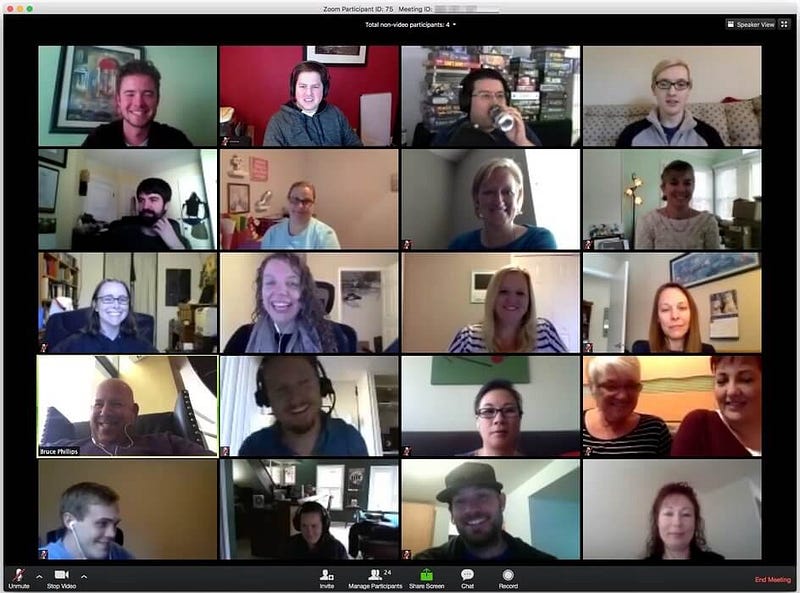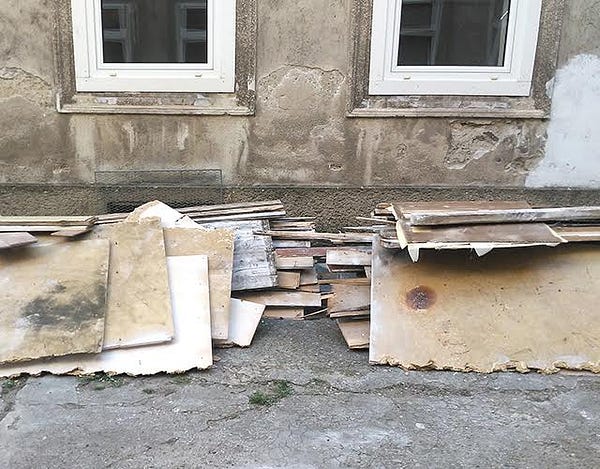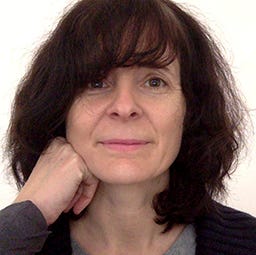A British transplant is thrust into telecommuting while sheltering in place.

Three keys and one door never before unlocked: I look at the options in my hands, their golden weight full of promise and yet trepidation. My first choice seems given — the key with the worn, plastic cap has to be the one. A woman standing in the opposite doorway watches as I try the lock. Although uncertain of a response, I venture a comment about the weather. She surprises me by agreeing in her broad Viennese accent, still audible despite the impersonal mask covering nose and mouth.
Once inside, corridor and stairs extend their echoing challenge, step by step. Up ahead, other doors await — four in a line. I bypass the welcome mats and tidy shoes, knowing to pick the most anonymous of all. The apartment block could have equally presented me with a wardrobe — once through the door, a hidden literary world opens up.
This is the publishing office where I will soon work, its many journals immediately on proud display. Beyond the entrance, every angle presents yet another individual still life — the suit jacket hung up carefully for later, every imaginable color of pen in a ready pot of efficiency, treasured photos of family otherwise usually absent from the workplace. I don’t linger. My solitary presence feels like an intrusion on lived-in yet latent space. And there’s work to be done.

Beyond the farthest door, an empty desk presents its invitation to settle. The last time I was in this particular room was just over a month ago. The euphoria is still tangible. My new colleagues, then sitting across the desk from me, had been discussing how to celebrate as I flourished my signature on the editorial job contract. The inclusive, considerate style of this nuclear, international team had already been evident. Whether it was going to be bubbly or a more sensible, sober glass, the idea had been clear — we would definitely toast my appointment the following Monday.
News of the office’s closure came as little surprise when it arrived the very next day, however; friends in northern Italy had already been updating me on each new measure to curb COVID-19. Why should Austria, across the border, be any different? Those who could would start working from home.
Monday’s online meeting was reassuring: How is everyone? How are friends and family? Our thoughts were initially scattered. Pragmatic concerns had taken various directions — the postponement of a trip eastward, the known impossibility of travelling south. Our various roots trace paths to Slovenia, Hungary, Poland, Greece, Turkey, Italy, Ireland, and the UK, figuratively traveling beyond closed borders. Meanwhile, daily household challenges, especially home schooling for children of all ages, needed to be considered. My first day may have been out of the ordinary, but these were new circumstances for everyone.
Throughout our chat, I was subliminally aware of small, individual, background details, each and every one a domestic signifier; the “home office”often doubles as someone’s bedroom, after all. As if complicit in their tasks, the washing laid out neatly on a clothes horse, which had crept in frame left, coupled with the iron poised top right on an adjacent wardrobe. The child’s room draped with fabric neighboured a cat’s playful, off-screen non-appearance. How unusual it was to have this glimpse into the private spaces of work colleagues, especially so soon.
Given the circumstances, I felt especially motivated. Could this virtual closeness with people I barely know have really created such a sense of cooperation so soon? Or was it the harsh reality beyond each separate room that focused our care?

After waving goodbye to everyone in my screen, I folded it back to the tabletop. The space that opened up, which no-one could have seen, not even me, revealed yet more white wall. Such plain squareness had recently become increasingly valuable.
When I took this affordable safe haven late last year, I had been affectionately known as the Brexit refugee. Now, I was on a fast-track migration path, and yet my day-to-day was going to be dominated by the view overlooking other similar rooms built around a sparse courtyard. I’m more observant of the incidental here too — the heavily curtained window that ghosts open every day, the empty apartment directly opposite that mirrors my privacy turned isolation.
Weekly meetings have become relieving punctuation. I happened to log in slightly ahead of schedule for one and found my Slovenian colleague had too. The virtual nowhere space made up of multiple here and now places felt briefly casual. But, unlike the imagined quick catch up over coffee, we spoke about our respective home countries with contrary histories but common right-wing, populist governments creating uncertainty, especially for us personally at a remove. Our concern for friends and family back home unites us — a rare and precious moment of intimacy between two near strangers at distance had paradoxically been made possible by this extreme situation.After weeks of suspension, piece by piece, life is returning to something that should resemble normalcy here. Small shops and large city parks have been reopened. Construction workers have been allowed back to their building sites.
Now that renovation work is newly underway in the apartment below mine, the concentration I need to craft intricate written arguments has been interrupted by manual labor’s more insistent rhythms. And so the office has become my new safe haven.
It’s almost time for our weekly meeting. I log in to the video conferencing programme, ready to meet everyone in their various yet by now recognisable home settings. As I’m rearranging my new setup, a pleasantly surprised voice says, “Sarah, you’re in the office.” The sudden realization of my changed background reveals so much about how we currently live. The impressive wall of journals behind me is more familiar to those who aren’t here; irregularity has become the new norm.
*********************************************************

Sarah Waring is a UK-born writer and editor. She is the author of Farming for the Landless (EN) / Agricoltura per senza terra (IT), edits for Eurozine and manages the zine publication traverzine. Her forthcoming book, Stray Pieces: Between capture and escape, is due for publication this year.
The original version of this text was translated and published in Slovenian by the leading broadsheet Delo.








